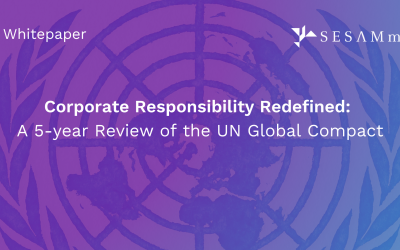Solving the sustainable investment challenge
How do we solves the sustainable investment challenge? Find out in a new blog from Kingsley Ford, Global Head of Index Investments Group at FTSE Russell.

The sustainability imperative is adding an extra layer of complexity to investment management. Investors are increasingly turning to tailored solutions.
The rise of sustainable investment is making life more complicated for investors and investment managers. While they continue to face the constant challenge of balancing risk and return, they must now also manage the additional layer of complexity introduced by the imperative to take sustainability considerations into account.
This is the fundamental problem that most investors come to us with as they look for sustainable investment solutions for their clients or beneficiaries. How can they balance sustainability objectives with investment performance goals?
As the mood in global markets turns darker, this question is only getting more urgent. Because the drivers that have led to a boom in sustainable investments as markets have risen in recent years remain in place. Whether as a result of investor preference, regulatory requirements, corporate commitments or from the growing realisation that climate and other environmental, social and governance (ESG) factors can be important determinants of investment performance, demand for sustainable investment is only headed in one direction.
The good news for clients is that there is a growing suite of sustainable investment solutions that balance delivering sustainability outcomes with risk and return characteristics of standard benchmarks. Indices can be designed that resemble standard benchmarks, but tilt towards companies with better sustainability performance or prospects. Strategies are available that provide exposure to the burgeoning green economy so that capital can be directed towards those industrial giants who are most effectively pivoting towards the low-carbon transition, rather than simply excluding all fossil fuel related companies.
But no two investors are the same. For these solutions to work well, as much attention needs to be paid to each client’s sustainable investment objectives as to their risk-return goals. Whilst we provide a wide range of off-the-shelf, standard indices, often a tailored index is more suitable for solving a specific client’s requirements.
One fast-moving trend we have seen is clients wanting to apply similar climate transition solutions across asset classes. As such, we have worked with clients to design indices for the launch of ETFs and funds across equities (FTSE TPI Climate Transition Indices), fixed income (FTSE Climate Risk Adjusted Government Bonds), real estate (FTSE EPRA Nareit Green) and infrastructure (FTSE Core Infrastructure TPI) asset classes. These indices aim to reduce the risks associated with climate change, whilst also targeting the growth segments set to benefit from the transition to a low carbon economy. These indices are either used as standard or are tailored to meet the local market ecosystem trends and investor requirements as bespoke solutions.
For asset owner investors, shifting large parts of their portfolios into sustainable investments can be a multi-year process, requiring exhaustive analysis of the options available and the likely impact on investment performance. They are often highly sensitive to the degree to which a sustainable investment strategy would introduce tracking error compared with a mainstream market benchmark. Here, it tends to be a process of finding a balance between sustainability impact and the degree of tracking error they are comfortable with.
For example, New York State Common Retirement Fund sought an index-tracking fund that both provided exposure to US corporations that are aligning their businesses with the climate transition, while reflecting the performance of US large-caps. It chose a mandate based on the Russell 1000 TPI Climate Transition Index, which varies the weights of constituents based on climate risk and opportunities.
Some asset owners, meanwhile, are looking for entirely bespoke solutions. We worked with Dutch pension fund Detailhandel to develop a customised index aligned with companies that were delivering against four of the 17 UN Sustainable Development Goals, while also retaining the characteristics of a passively managed broad market equity portfolio. This same approach has then been extended into their fixed income portfolio.
Similarly, Japan’s Government Pension Investment Fund (GPIF), the world’s largest pension fund, was looking to better integrate ESG considerations into its flagship equity fund. We worked with GPIF to design the FTSE Blossom Japan Index which, while closely tracking its traditional market capitalisation-weighted benchmark, is weighted towards companies with higher ESG ratings and which deliver impact in line with the UN Sustainable Development Goals. The GPIF has allocated $6.2 billion to a new passive fund tracking the index.
But it’s not just providing solutions – it’s also about educating investors and developing the ecosystem. For all that sustainable investment is fast becoming mainstream, it remains a novel concept for many investors. We work with ETF providers and fund managers to help them educate their investor base on sustainable investment index solutions that underpin their investible products, providing explainers and research material to help their clients understand the concepts at play.
We understand that critical to the value of an index solution is the data that underpins it. Therefore, we have worked with the Church of England Pensions Board, the London School of Economics and the UK’s Environment Agency Pension Fund to develop the Transition Pathway Initiative (TPI), which is supported by 131 asset owners, managers and services providers representing over $50 trillion of assets. We provide the data to enable the TPI to assess the progress of almost 600 of the world’s largest emitting companies towards the low-carbon economy, taking a forward-looking approach to management quality and carbon performance. This is helping a wide range of investors to better understand the climate exposure of their investments and underpins our FTSE TPI Climate Transition Indices.
Ultimately, we recognise the need to help educate the wider market if the financial sector is to play its part in the transition to a more sustainable economy. As part of the London Stock Exchange Group, we share its critical role in enabling the green economy, bringing rigour, transparency and high standards of governance to our work on sustainable finance and investment.
We understand the questions our clients are grappling with as sustainable investing evolves from optional extra to must-have. By listening to their needs and adapting our solutions in response, we believe we can help provide some of the answers.
The future of investment is sustainable investment. Discover more about how FTSE Russell is combining expert data capabilities and a multidisciplinary team of thought leaders to drive innovation through our multi-asset class indexes, analytics and research, helping you to share your sustainable investment strategies. Discover more.
© 2022 London Stock Exchange Group plc (the “LSE Group”). All information is provided for information purposes only. Such information and data is provided “as is” without warranty of any kind. No member of the LSE Group make any claim, prediction, warranty or representation whatsoever, expressly or impliedly, either as to the accuracy, timeliness, completeness, merchantability of any information or of results to be obtained from the use of FTSE Russell products or the fitness or suitability of the FTSE Russell products for any particular purpose to which they might be put. Any representation of historical data accessible through FTSE Russell products is provided for information purposes only and is not a reliable indicator of future performance. No member of the LSE Group provide investment advice and nothing contained in this document or accessible through FTSE Russell products should be taken as constituting financial or investment advice or a financial promotion. Use and distribution of the LSE Group data requires a licence from an LSE Group company and/or their respective licensors.






